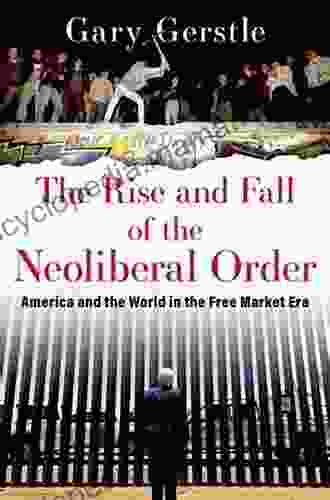The Rise and Fall of the Neoliberal Order: A Critical Examination

4 out of 5
| Language | : | English |
| File size | : | 1136 KB |
| Text-to-Speech | : | Enabled |
| Screen Reader | : | Supported |
| Enhanced typesetting | : | Enabled |
| Word Wise | : | Enabled |
| Print length | : | 420 pages |
| Lending | : | Enabled |
Neoliberalism, a political and economic ideology that emphasizes free markets, deregulation, and privatization, has played a dominant role in shaping global politics and economics since the 1970s. Its proponents argue that neoliberal policies promote economic growth and prosperity by reducing government intervention and allowing markets to operate freely. However, critics argue that neoliberalism has exacerbated inequality, social injustice, and environmental degradation. In this article, we will explore the rise and fall of neoliberalism, examining its key tenets, impact, and the reasons for its decline.
The Rise of Neoliberalism
The origins of neoliberalism can be traced back to the work of Austrian economists Friedrich Hayek and Ludwig von Mises in the 1940s and 1950s. Hayek argued that central planning and government intervention in the economy lead to tyranny and economic inefficiency. In contrast, he advocated for a free market economy with minimal government regulation. These ideas gained traction in the 1970s, as many countries faced economic stagflation (a combination of high inflation and high unemployment) and sought alternatives to Keynesian economic policies.
In the United States, the rise of neoliberalism was closely associated with the presidency of Ronald Reagan and the election of Margaret Thatcher as Prime Minister of the United Kingdom in 1979. Reaganomics and Thatcherism became synonymous with neoliberal policies such as tax cuts, deregulation, and privatization. These policies were implemented in the belief that they would stimulate economic growth and reduce government spending.
The Key Tenets of Neoliberalism
Neoliberalism is based on several key tenets:
- Free markets: Neoliberals believe that free markets are the most efficient and effective way to allocate resources and promote economic growth. They argue that government intervention in the economy, such as price controls, regulations, and subsidies, distorts markets and leads to inefficiency and waste.
- Deregulation: Neoliberals advocate for deregulation, or the reduction of government regulations on businesses. They argue that regulations stifle innovation, increase costs, and impede competition. By removing regulations, businesses are free to operate more efficiently and consumers have more choices.
- Privatization: Neoliberals believe that the private sector is more efficient than the public sector. They advocate for the privatization of state-owned enterprises, arguing that this will lead to increased efficiency, innovation, and lower costs.
- Fiscal responsibility: Neoliberals believe that governments should maintain fiscal responsibility by controlling spending and keeping deficits and debt levels low. They argue that fiscal responsibility is essential for promoting economic stability and preventing inflation.
- International trade: Neoliberals support free trade and globalization, arguing that these policies promote economic growth and prosperity by increasing competition and expanding markets.
The Impact of Neoliberalism
The implementation of neoliberal policies has had a significant impact on the global economy and society. Some of the key impacts include:
- Economic growth: Neoliberal policies have been credited with promoting economic growth in many countries. By reducing government intervention and regulations, businesses have been able to invest more and innovate, leading to increased productivity and job creation.
- Globalization: Neoliberalism has accelerated globalization by promoting free trade and investment. This has led to increased competition, lower prices, and a wider variety of goods and services for consumers.
- Inequality: Neoliberal policies have also been associated with rising inequality. By reducing taxes on the wealthy and corporations, and by cutting social programs, neoliberal policies have shifted the distribution of wealth towards the top 1% of the population. This has led to increased poverty and social unrest in many countries.
- Financial instability: The deregulation of the financial sector under neoliberalism has been blamed for the financial crisis of 2008. By allowing banks to take excessive risks, the deregulation led to a bubble in the housing market and a subsequent collapse that plunged the global economy into recession.
- Environmental degradation: Neoliberal policies have also been criticized for their impact on the environment. By reducing environmental regulations, neoliberal policies have allowed businesses to pollute the environment with impunity. This has led to increased air and water pollution, deforestation, and climate change.
The Fall of Neoliberalism
In recent years, there has been a growing backlash against neoliberalism. The financial crisis of 2008, the rising inequality, and the environmental degradation caused by neoliberal policies have led to widespread disillusionment with the ideology. In addition, the rise of populism and nationalism in many countries has led to a rejection of globalization and free trade.
As a result of these factors, neoliberalism has begun to decline. Many governments are now implementing policies that are more focused on social justice, environmental protection, and economic stability. For example, the government of President Joe Biden in the United States has proposed a number of policies that would increase taxes on the wealthy, expand social programs, and invest in clean energy.
Neoliberalism has been a dominant economic ideology for decades, shaping global politics and economics in profound ways. Its key tenets of free markets, deregulation, privatization, and fiscal responsibility have led to economic growth and globalization, but also to inequality, social injustice, and environmental degradation. In recent years, there has been a growing backlash against neoliberalism, and it is now in decline. As governments adopt more progressive policies, it is likely that neoliberalism will continue to fade into the background.
While the future of neoliberalism is uncertain, it is clear that the ideology has had a lasting impact on the world. It is important to understand the key tenets of neoliberalism and its impact in order to make informed decisions about the future of our economy and society.
4 out of 5
| Language | : | English |
| File size | : | 1136 KB |
| Text-to-Speech | : | Enabled |
| Screen Reader | : | Supported |
| Enhanced typesetting | : | Enabled |
| Word Wise | : | Enabled |
| Print length | : | 420 pages |
| Lending | : | Enabled |
Do you want to contribute by writing guest posts on this blog?
Please contact us and send us a resume of previous articles that you have written.
 Top Book
Top Book Novel
Novel Fiction
Fiction Nonfiction
Nonfiction Literature
Literature Paperback
Paperback Hardcover
Hardcover E-book
E-book Audiobook
Audiobook Bestseller
Bestseller Classic
Classic Mystery
Mystery Thriller
Thriller Romance
Romance Fantasy
Fantasy Science Fiction
Science Fiction Biography
Biography Memoir
Memoir Autobiography
Autobiography Poetry
Poetry Drama
Drama Historical Fiction
Historical Fiction Self-help
Self-help Young Adult
Young Adult Childrens Books
Childrens Books Graphic Novel
Graphic Novel Anthology
Anthology Series
Series Encyclopedia
Encyclopedia Reference
Reference Guidebook
Guidebook Textbook
Textbook Workbook
Workbook Journal
Journal Diary
Diary Manuscript
Manuscript Folio
Folio Pulp Fiction
Pulp Fiction Short Stories
Short Stories Fairy Tales
Fairy Tales Fables
Fables Mythology
Mythology Philosophy
Philosophy Religion
Religion Spirituality
Spirituality Essays
Essays Critique
Critique Commentary
Commentary Glossary
Glossary Bibliography
Bibliography Index
Index Table of Contents
Table of Contents Preface
Preface Introduction
Introduction Foreword
Foreword Afterword
Afterword Appendices
Appendices Annotations
Annotations Footnotes
Footnotes Epilogue
Epilogue Prologue
Prologue Paul Jackson
Paul Jackson Fiona Buckley
Fiona Buckley K C Lannon
K C Lannon Irene Kim
Irene Kim Larry Swedroe
Larry Swedroe Andrew K Milton
Andrew K Milton Scott Meslow
Scott Meslow Sebastian Scheplitz
Sebastian Scheplitz Ari Whitten
Ari Whitten Keith Blenman
Keith Blenman Maurice Regis
Maurice Regis Kristi Carlson
Kristi Carlson Katie Novak
Katie Novak Mariko Tatsumoto
Mariko Tatsumoto Jina Bacarr
Jina Bacarr Radha Chadha
Radha Chadha Martin Hare
Martin Hare Maziar Rajabi
Maziar Rajabi Francine Rivers
Francine Rivers Jean Anyon
Jean Anyon
Light bulbAdvertise smarter! Our strategic ad space ensures maximum exposure. Reserve your spot today!

 Gabriel Garcia MarquezUnraveling the Horrors: Deal With the Devil - 31 Terrifying Tales From the...
Gabriel Garcia MarquezUnraveling the Horrors: Deal With the Devil - 31 Terrifying Tales From the... Cormac McCarthyFollow ·2.3k
Cormac McCarthyFollow ·2.3k Rob FosterFollow ·15.8k
Rob FosterFollow ·15.8k Roberto BolañoFollow ·18.4k
Roberto BolañoFollow ·18.4k Marvin HayesFollow ·5k
Marvin HayesFollow ·5k Gordon CoxFollow ·8.6k
Gordon CoxFollow ·8.6k Rick NelsonFollow ·10.7k
Rick NelsonFollow ·10.7k Leslie CarterFollow ·15.9k
Leslie CarterFollow ·15.9k VoltaireFollow ·4.7k
VoltaireFollow ·4.7k

 Fabian Mitchell
Fabian MitchellTen Thousand Spirals: Leccion Inagural Del Curso...
Ten Thousand...

 Howard Blair
Howard BlairThe Captivating Collection of High School Romance Poetry
Love's First...
4 out of 5
| Language | : | English |
| File size | : | 1136 KB |
| Text-to-Speech | : | Enabled |
| Screen Reader | : | Supported |
| Enhanced typesetting | : | Enabled |
| Word Wise | : | Enabled |
| Print length | : | 420 pages |
| Lending | : | Enabled |

















